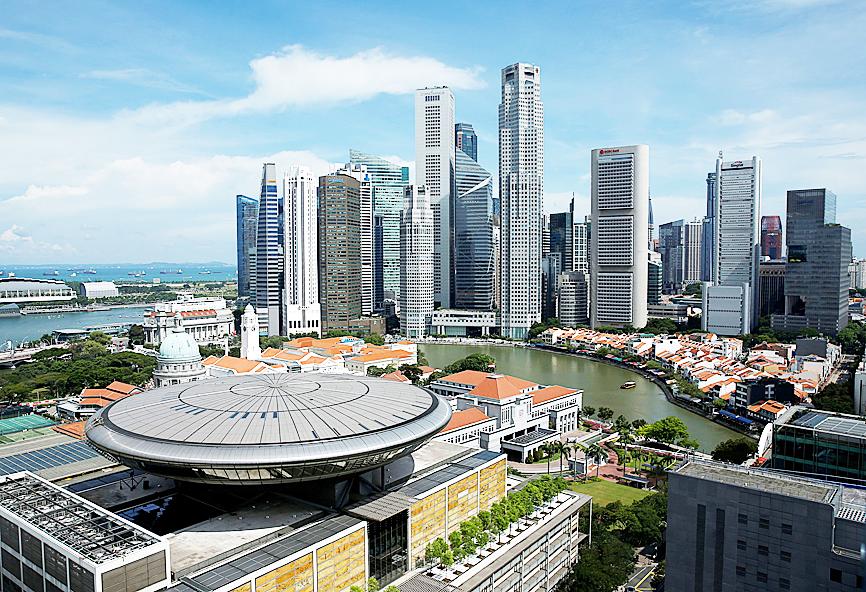Australia granted “major project status” to an ambitious A$22 billion (US$15.8 billion) plan to export power from a giant solar farm in the country’s north to Southeast Asia via undersea cable.
The status recognizes the “strategic significance” of the project, which is expected to inject billions of dollars into the economy and create thousands of jobs, Australian Minister for Energy and Emissions Reduction Angus Taylor said in a statement yesterday.
The Australia-ASEAN Power Link envisions connecting the world’s largest solar farm and battery system in Australia’s Northern Territory to Singapore and Indonesia via a 3,700km undersea cable.

Photo: Reuters
Similar proposals for long-haul, transnational power shipments have been pursued in other regions, including from North Africa to Europe, and from Mongolia to Japan and South Korea.
The high-profile boost by the Australian government contrasts with the relatively muted interest from Singapore, which is expected to be its main customer.
The city-state’s Energy Market Authority in November last year acknowledged that it had met with the project’s developer, Sun Cable Pty Ltd, but has shown little public appetite in the venture.
The authority did not immediately respond to a request for comment yesterday.
Sun Cable has said that the project could supply one-fifth of Singapore’s power needs, helping to reduce its reliance on imports.
The project, which is backed by Atlassian cofounder Mike Cannon-Brookes and Fortescue Metals Group founder Andrew Forrest, plans to start marine survey work from August.
Sun Cable is targeting commercial operations to begin in 2027.
The major project status provides the Sun Cable project with government support that includes a single entry point for national approvals, and assistance with state and territory approvals.

AIR SUPPORT: The Ministry of National Defense thanked the US for the delivery, adding that it was an indicator of the White House’s commitment to the Taiwan Relations Act Deputy Minister of National Defense Po Horng-huei (柏鴻輝) and Representative to the US Alexander Yui on Friday attended a delivery ceremony for the first of Taiwan’s long-awaited 66 F-16C/D Block 70 jets at a Lockheed Martin Corp factory in Greenville, South Carolina. “We are so proud to be the global home of the F-16 and to support Taiwan’s air defense capabilities,” US Representative William Timmons wrote on X, alongside a photograph of Taiwanese and US officials at the event. The F-16C/D Block 70 jets Taiwan ordered have the same capabilities as aircraft that had been upgraded to F-16Vs. The batch of Lockheed Martin

GRIDLOCK: The National Fire Agency’s Special Search and Rescue team is on standby to travel to the countries to help out with the rescue effort A powerful earthquake rocked Myanmar and neighboring Thailand yesterday, killing at least three people in Bangkok and burying dozens when a high-rise building under construction collapsed. Footage shared on social media from Myanmar’s second-largest city showed widespread destruction, raising fears that many were trapped under the rubble or killed. The magnitude 7.7 earthquake, with an epicenter near Mandalay in Myanmar, struck at midday and was followed by a strong magnitude 6.4 aftershock. The extent of death, injury and destruction — especially in Myanmar, which is embroiled in a civil war and where information is tightly controlled at the best of times —

Taiwan was ranked the fourth-safest country in the world with a score of 82.9, trailing only Andorra, the United Arab Emirates and Qatar in Numbeo’s Safety Index by Country report. Taiwan’s score improved by 0.1 points compared with last year’s mid-year report, which had Taiwan fourth with a score of 82.8. However, both scores were lower than in last year’s first review, when Taiwan scored 83.3, and are a long way from when Taiwan was named the second-safest country in the world in 2021, scoring 84.8. Taiwan ranked higher than Singapore in ninth with a score of 77.4 and Japan in 10th with

SECURITY RISK: If there is a conflict between China and Taiwan, ‘there would likely be significant consequences to global economic and security interests,’ it said China remains the top military and cyber threat to the US and continues to make progress on capabilities to seize Taiwan, a report by US intelligence agencies said on Tuesday. The report provides an overview of the “collective insights” of top US intelligence agencies about the security threats to the US posed by foreign nations and criminal organizations. In its Annual Threat Assessment, the agencies divided threats facing the US into two broad categories, “nonstate transnational criminals and terrorists” and “major state actors,” with China, Russia, Iran and North Korea named. Of those countries, “China presents the most comprehensive and robust military threat